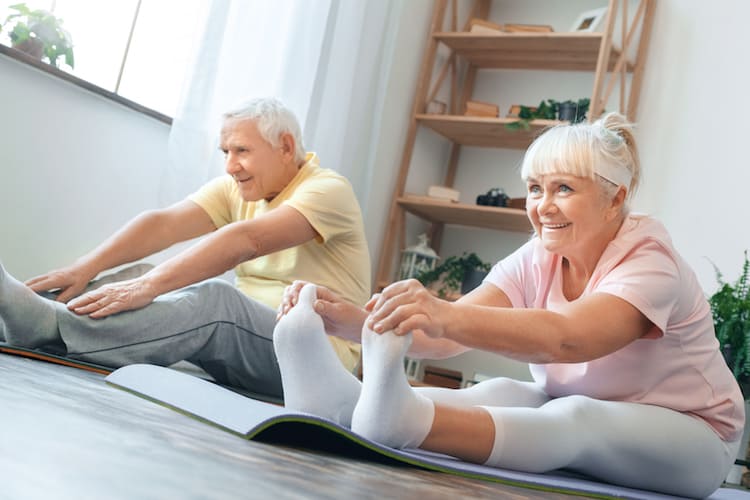We are experiencing a time of uncertainty in our world as concerns about COVID-19 are communicated from government health agencies and news sources. People who have never experienced mental health symptoms before are feeling depressed and anxious, and people who have dealt with these issues in the past are experiencing exacerbations. People already suffering with mental health issues may experience a worsening of symptoms. If you are feeling depressed or anxious, it is important to remember you are not alone and there are healthy steps you can take to improve mental health during this challenging time. As an added benefit, improving your mental health can improve your physical health. Reducing the amount of stress you feel can improve your immunity.

A national survey conducted between March 13 and 16, 2020, as the public became more aware of the COVID-19 issue, found that 80 percent of people reported concern about the coronavirus. While only 8% of people reported their physical health had gotten worse, 22% reported their mental health declining and 29% said their emotional well-being was worse.
When facing the unknown, it’s easy to fall prey to what neuroscientists call “negativity bias,” a tendency to focus on threats and contemplate worst-case scenarios. This results in depressed, anxious feelings that begin to manifest themselves physically. Symptoms may include trouble sleeping, inability to focus, increased use of alcohol, tobacco or other substances, and flares of chronic health problems. When we feel depressed or anxious, exercising, interacting with others and making healthy food choices can quickly fall by the wayside. The added recommendations for social distancing or isolating may cause people to feel alone too. There’s nothing strange or unusual about experiencing these feelings, and fortunately, there are things we can do to feel better.
In addition to the physical health tips you’re applying to keep yourself healthy, incorporate these mental health tips to feel better and give your immune system a positive boost.
Healthy Thinking

- Remind yourself this won’t last forever. While experts say COVID-19 may have an impact in the US longer than we would like, this will not be unending. Think of times past when challenges have successfully been overcome as a country, community, company or family and realize that this too will pass. Think about the future and make plans for something you want to do and take action toward it. Research for a future trip. Work toward steps that could lead to a promotion. If you’d like to run a half marathon, begin training now.
- Differentiate between what’s in your control and what’s not. Then, focus on the things that are in your control and steer your thoughts away from things outside of your control.
- Be matter of fact. Avoid the tendency to imagine a situation in your mind that is worse than reality. Consider your situation today and the steps you need to take to be safe such as social distancing and proper hand-washing.
- Look for opportunities. Rather than focus on the bad, or the things you can’t do, focus on the good and the opportunities you may not see until you take a hard look. What are you grateful for? What can you do with the time you’re saving on your commute.
- Focus on the positive. Remind yourself that experts around the world are hard at work containing the virus and developing a vaccine.
- Do your part. Staying at home can feel like you’re doing nothing, but experts tell us helping to “flatten the curve” is the most important way we can help at this time. Remind yourself that social distancing or social isolation is a temporary situation and by adhering to the request, you are making a true difference in the trajectory of this virus.
- Focus on what is true. Many people who test positive for COVID-19 experience no symptoms or only minor symptoms and most recover well. You can lessen your chances of getting COVID-19 significantly by practicing proper hand washing, avoiding touching your face and practicing social distancing.
Healthy Actions

- Commit to a daily routine. Regular schedules add a sense of normalcy and feel comforting, so keep your daily routine to the extent that you can, or create a new routine if needed. Sleep, eat and take your medicines at the same time each day and maintain a healthy balance of work and relaxation. When planning your activities, toss in a little variety each day to prevent boredom. Plan something you enjoy for the evening—a favorite food, game or show—something to look forward to throughout the day.
- Exercise. Exercise is always important, but especially so during times of stress. Exercise gives you a boost of serotonin, which helps with healthy mood regulation. If you’re already routinely exercising, keep it up. If not, consider adding an outside walk each day. For added benefit, walk outside in the early morning. It is a scientific fact that early morning sunshine improves mood. Seeing other people as you walk in your neighborhood or park will help negate feelings of isolation as well. On rainy days, Google a yoga class. Yoga is known for reducing stress, doesn’t require much space, can be practiced by any age, and you can find beginner videos online free of charge.
- Enjoy nature. Whether it’s walking in the park or working from your balcony, try to incorporate sunshine and nature into every day.

- Live in the moment. If your mind starts to race ahead with worry, focus on your senses to bring you back to the present moment. What are you seeing? What are you hearing? What were you doing before the worry distracted you?
- Stay informed, but don’t stay tuned in. Seek on the information needed to make good decisions for you and your loved ones and limit the amount of time you spend reading, listening to or watching media that stresses you. Consuming too much media can create anxiety. You may find that reading, is less stress invoking that watching TV because you do not have visuals that linger in your mind.
- Mute alarming alerts. You can change the settings on your phone, mute keywords that trigger anxiety on Twitter, and hide Facebook posts or feeds that make you feel overwhelmed. If you leave your TV on for company, tune in to a non-news show.
- Connect with others. Don’t equate social distancing or isolation requirements emotional distancing or emotional isolation. Ironically, social isolation may result in improved connection with family members who live in your home, or time home alone may give you the extra time to catch up or reconnect with old friends via phone, email or social media. If you live alone, proactively pursue emotional connection with others and remind yourself that you’re not alone—we’re all in this together. Talk with people you trust about your concerns.
- Get creative. Avoiding isolation is important for mental health and with social distancing recommendations, it’s important to think creatively. Here are some tips to help you and your loved ones stay connected in meaningful ways:
-
- Make a phone call. While text messaging can be convenient, hearing the voice of a friend or family member and having a real conversation is a little closer to being there. This is possible even with elderly relatives who may not be savvy about using FaceTime.
- Plan virtual gatherings. That dinner with friends that was scheduled for next Saturday night? Keep it using a virtual tool like Skype.
- Enjoy dinner together. Make it feel like a real date by enjoying the same entree together virtually over Skype.
- Start a book club. Start a virtual book club with friends. You may want to choose a light subject matter to add levity to your reading time and conversations.
- Take a walk in your neighborhood or a nearby park. Enjoy spending time with others in a public space where it’s easy to practice social distancing. As an added benefit, sunshine, fresh air and exercise are good for your mental health too.
- Get to know your neighbors. Spend time on your balcony, deck or in your yard and chat with neighbors from a safe distance.
- Adhere to recommended guidelines. If you struggle with OCD, recommendations to wash your hands or stay indoors and avoid contact may be especially difficult for you and boredom may make your symptoms worse. Remind yourself of recommended guidelines and hold yourself accountable to align your actions with them.
- Schedule worry time. If you feel overwhelmed with worry, schedule no more than an hour each day to contemplate your concerns. Do not allow yourself to think about things that concern you outside of that hour.
- Accomplish something. Accomplishment feels good, so use the additional time you have to check a task off your list, whether it be reading a book, cleaning your closet or doing a spring deep clean.
- Continue treatment to the best of your ability. If you are receiving treatment for a mental health issue, continue your treatment. If you take medications, pick up your refills as soon as they are available. If your prescriptions are for 30 days, ask your doctor if he can provide a prescription for a 90-day supply instead. As about online appointments when in-person meetings are not recommended.
- Do a good turn daily. Ask yourself if there is an act of kindness you can do for someone. Picking up supplies for an elderly relative. Calling to check on someone who lives alone. Helping others helps you feel better too.
Healthy Conversations

- Get face-to-face thanks to technology. Research tells us that seven percent of communication comes through our words, 38 percent through our voice and 55 percent through our body language. Use Facetime, Skype, Zoom and similar technologies to make communication more human when being there in person is not possible.
- Reassure kids. It is important to communicate with children factually in ways that are appropriate for their age and temperament. Center your conversation around the need for them to be away from their friends for now because of the risk germs spreading pose to our elderly population. Reassure them that children typically do not get very sick from this germ. Explain the steps you are taking to keep your family healthy and allow them to ask questions.
- Assist the elderly. We know that COVID -19 has affected the elderly more, and especially those with compromised health. The elderly should follow all recommendations even though things do not look bad yet in this country. Recognize that limited sight or hearing or lack of skills with technology may cause them to miss important information. They may also fall prey to fake news circulating by email. Make sure they are aware of accurate recommendations, listen to their question and concerns and offer to help with errands.
- Be helpful, allow for differing opinions and set boundaries. Friends or family members who are not taking recommendations seriously may cause you anxiety. The COVID-19 situation is hard for people to wrap their minds around. In Florida, we have to contend with hurricanes and it’s common for people to become quite anxious in the days leading up to a hurricane. Preparing for a hurricane is a good analogy for preparing for COVID-19. You have to prepare for something that is days in the future, but when you go outside everything looks normal. In the case of a hurricane, the damage we’ve seen from past storms informs us of what to do. If you don’t follow guidelines you put yourself in danger. In the case of COVID-19, the impacts of previous epidemics and the news we’ve seen unfold with COVID-19 in China and Italy help us understand how to prepare. Likening it to a situation they already have familiarity with can make it easier to understand. There are many reliable articles you can share with people who are not taking recommendations seriously, but some people will hold different opinions. If this causes you anxiety, you can set healthy boundaries to keep you and your loved ones safe, like interacting with the person through technology instead of being in close proximity.
Join Our Weekly YouTube Live
Mental Health expert and TMS pioneer Dr. Upshaw joins you from the comfort of your own home to answer all your mental health questions:
NEXT LIVE: Using Mindfulness to Navigate Difficult Times
DATE: July 16th, 2020 @6:30 PM ET
Watch Dr. Upshaw Feel Good Videos
Depresion & anxiety expert, Dr. Nate Upshaw of NeuroSpa TMS ®, helps you cope with Coronavirus anxiety with simple tips and advice added weekly to our NeuroSpa TMS ® YouTube channel
NeuroSpa TMS ®



